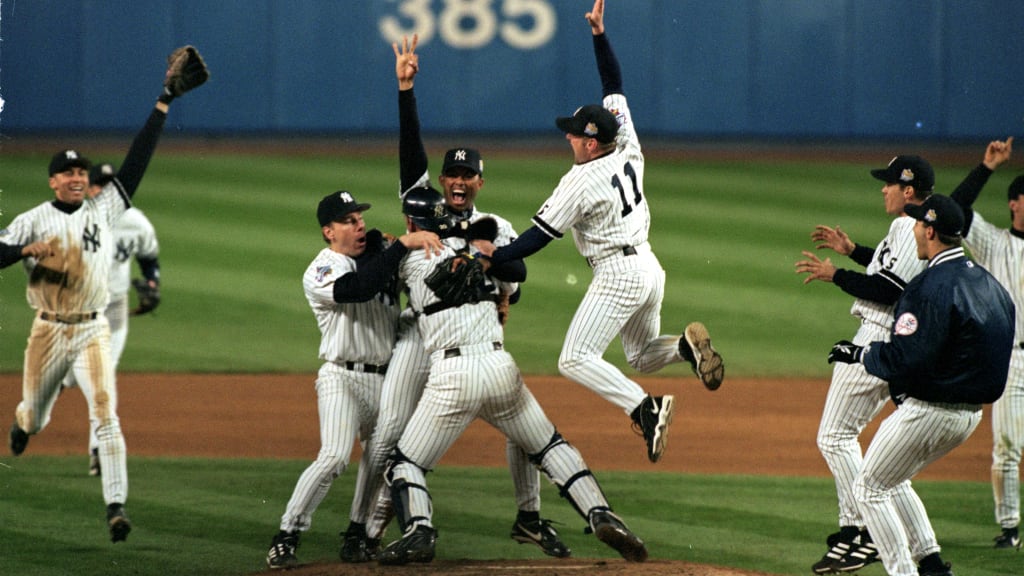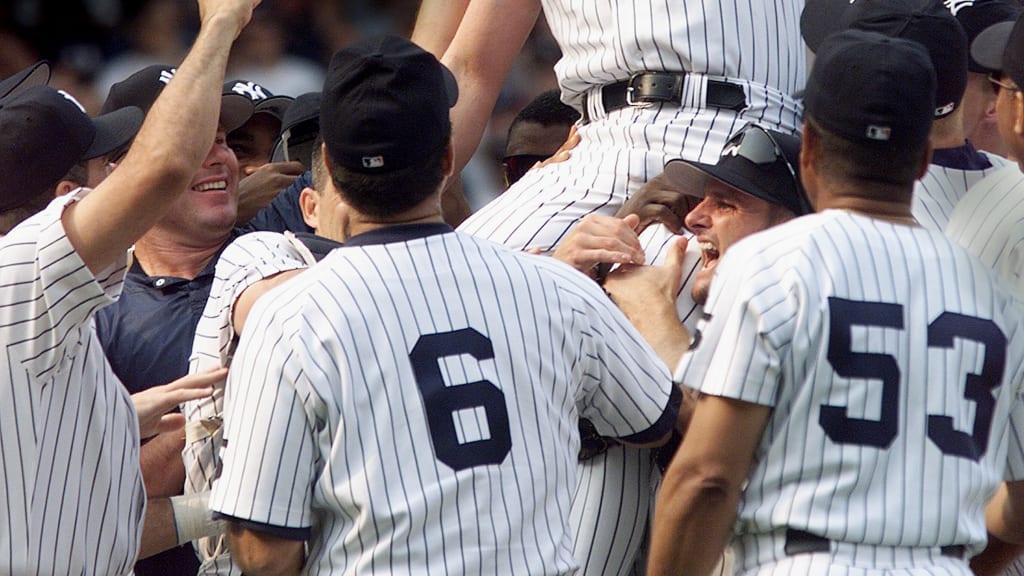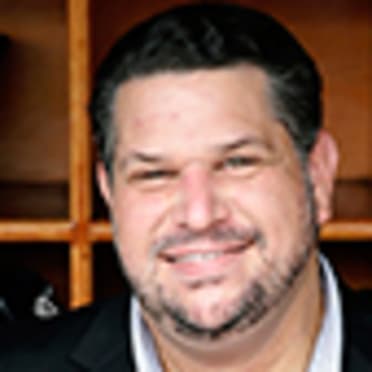
Every championship team has its own story. For the 1999 Yankees, that tale had as much to do with the teams that preceded and followed them as anything they did themselves.
The 1998 club set what was then an American League record with 114 victories, rattling off 11 more in October to finish with an incredible 125 wins, a World Series title and a legitimate claim as the best team in baseball history.
In 2000, the Yankees limped into the postseason before making another run, capturing their third straight title in the most memorable fashion possible: a Subway Series triumph over the crosstown-rival Mets, a matchup New York fans had desperately craved for four decades.
But all the 1999 Yankees did was methodically grind their way to a 98-win season and a third world championship in four years.
¡°Obviously, 1998 was such a magical year, and 2000 had the Mets-Yankees thing,¡± says Paul O¡¯Neill. ¡°But you can never make World Series championships small because they¡¯re so hard to win. To be able to repeat is difficult. You¡¯re still trying to hold on to that feeling of being a world champion. When you look back at 1999 and you know how hard it is to repeat with basically the same people, that¡¯s the story to me.¡±
The central cast of characters remained intact following the historic 1998 season, as free agents David Cone, Scott Brosius (who won ¡¯98 World Series MVP honors) and Bernie Williams all returned on new contracts. Williams, a life-long Yankee who played such an integral role on the 1998 team, nearly defected to Boston that winter, a move that might have changed the course of history for both franchises.
How close was it? The Yankees were courting free-agent slugger Albert Belle, while Williams appeared to be closing in on a deal with the rival Red Sox. ¡°It looked touch-and-go for a while,¡± Hall of Fame manager Joe Torre says. ¡°I went out to Arizona and played golf and had dinner with Albert Belle. I thought it was a done deal.¡± Instead, Belle signed with the Baltimore Orioles and Williams came back to the Bronx, rewarding George Steinbrenner and the Yankees with a .342 average, .971 OPS, 25 home runs and 115 RBI in the first year of his new contract.
The gang was back together again with an opportunity to properly defend its title.
¡°Any time you win, there¡¯s always the pressure to continue to win,¡± O¡¯Neill says. ¡°That was one of the main things that Mr. Steinbrenner did that people never gave him credit for. You don¡¯t see it in baseball anymore; teams win now and then everybody goes their separate ways. He was very intent on keeping that team together and putting together that phenomenal run.¡±
***
As the Yankees gathered at Legends Field for Spring Training, everything seemed to be in place for Torre¡¯s team to take aim at a third championship in four years.
Pitchers and catchers had barely unpacked their bags when second-year general manager Brian Cashman pulled off a blockbuster trade, sending David Wells, Graeme Lloyd and Homer Bush to the Blue Jays for Roger Clemens, the five-time American League Cy Young winner who had won the award in each of the previous two seasons with Toronto.
¡°Mr. Steinbrenner always mixed it up; we win 114 games, 125 total, and the next thing you know, he makes a trade to get Roger Clemens,¡± reliever Jeff Nelson says. ¡°Once everybody signed back, you figured, ¡®We¡¯re going to be the favorites to win the World Series again.¡¯ The next thing you know, we¡¯re getting Clemens in the first week of Spring Training.¡±
Torre¡¯s message to his team that spring was simple: Last year was phenomenal, but once the first pitch is thrown, it doesn¡¯t mean a thing.
¡°Spring Training is so important because you¡¯re sending a message that you¡¯re still going to do all the fundamental, boring things that everybody knows how to do,¡± Torre says. ¡°I felt it was important to do that because you don¡¯t want to send a message that we don¡¯t need to do those things.¡±
The spring, though, would be anything but routine or mundane. Less than four weeks before the Yankees were slated to open the season in Oakland, Torre received some devastating news: He had prostate cancer. The manager underwent surgery soon after his March 10 diagnosis, stepping aside for what would end up being a bit more than two months. Don Zimmer, Torre¡¯s friend and trusted bench coach, managed the team in his place.
¡°Zim was not your typical bench coach,¡± O¡¯Neill says. ¡°He was a big, big part of that team. We were left in good hands.¡±
The Yankees got off to a solid start in Torre¡¯s absence, racing out to a 7-1 mark. As dominant as the ¡¯98 team had been, the ¡¯99 team stormed out of the gate with a sense of purpose.
¡°Our manager was gone, so we obviously couldn¡¯t let down,¡± Nelson says. ¡°We didn¡¯t want to go in a direction where when he came back, we¡¯d have to flip a switch and turn it around. We were playing for something; we were playing for Joe and playing for Zim at the same time.¡±
But the Red Sox weren¡¯t making life easy for the Yankees, who found themselves tied with Boston in the AL East on May 15. Three days later, Torre decided he was ready to return to the dugout, surprising his team as he showed up at Fenway Park for the first game of a series against the Sox. At Zimmer¡¯s suggestion, Torre brought the lineup card to the plate prior to the game. The Boston crowd gave Torre a two-minute standing ovation, while the Fenway scoreboard read, ¡°Welcome back.¡±
¡°That was a very powerful evening,¡± Torre says. ¡°Especially where I was emotionally at that point in time, it meant a lot.¡±
***
The Yankees went 11-9 during Torre¡¯s first three weeks back at the helm, and although they resided in second place throughout that stretch, they never fell further than 21?2?games out of first. An 11-5 win over the Phillies on June 9 vaulted them ahead of the Red Sox for the first time since Torre had returned, seemingly restoring order to the Yankees Universe.
They wouldn¡¯t spend another day out of first place that season.
¡°We came to the ballpark every day not thinking we had a chance to win, but expecting to win,¡± says reliever Mike Stanton. ¡°When we didn¡¯t, it upset us.¡±
The Yankees¡¯ four-game lead at the All-Star break matched their biggest since Torre¡¯s return, but they knew Boston wasn¡¯t going away anytime soon. The entire league was taking aim at the bull¡¯s-eye on the Yankees¡¯ back, so whether his team was facing the Red Sox or the second-year Devil Rays, Torre stressed the need to bring their A-game every night.
¡°To repeat is harder than doing it the first year because so many things have to go right for a team to win,¡± Torre says. ¡°After you win, the next year, everybody is out to get you. Every city you go to, for those teams and their fans, it would make their month or their year if they had a big series against the Yankees. You realize when you¡¯re part of a team like this that it doesn¡¯t matter what city you go to, you¡¯d better show up or teams will try to embarrass you.¡±
As the Yankees returned from the All-Star break, everybody was looking forward to July 18, when Yogi Berra would be honored prior to the game against Montreal. Little did they know there would be history of another kind, as David Cone pitched a perfect game against the Expos -- the Yankees¡¯ second perfecto in 15 months after Wells had accomplished the feat in May 1998.
¡°You could see the relief when [Cone] fell down after the final out,¡± O¡¯Neill says. ¡°He lives that the rest of his life; you can¡¯t take that day away from him.¡±

Cone¡¯s historic day served as a springboard of sorts for the Yankees, who went on a 17-7 run to put some space between themselves and the Red Sox. Boston trailed by 71?2?games entering September, and although the Sox pulled within three games in the final weeks of the season, the Bombers held on for their second straight division title. Shortstop Derek Jeter completed a monster season, leading the Majors with 219 hits and posting other career bests in batting average (.349), home runs (24), RBI (102), runs (134) and triples (9).
The Yankees would have an opportunity to do what they had failed to do after winning the World Series in 1996: defend their title.
¡°Winning in ¡¯96 and then again in ¡¯98, we always thought, ¡®Just get to the postseason,¡¯¡± Tino Martinez says. ¡°We knew how to win. We knew if we got to October, we would have a good shot at it.¡±
¡°We were so ready for the postseason to get started,¡± Torre says. ¡°You know that if you don¡¯t win the World Series, the whole season was for naught.¡±
The final weeks of the season provided Torre with more than a chance at a third ring. It was during that time that the manager realized that his bout with cancer hadn¡¯t sapped his fierce competitive nature, something he wondered at times during the preceding four months. ¡°With cancer, you carry it with you. I was curious myself as to how important what I was doing for a living would be against living,¡± Torre says. ¡°What was the tug of war here?¡± A game in Toronto on Sept. 14 quelled any of Torre¡¯s concerns that he might be going through the motions.
¡°We had bases loaded and we were behind in the game, and I was willing to make any trade if Bernie got a hit,¡± Torre says. ¡°He hit a home run. I realized at that point I was back. You were curious if you¡¯d still have the same hunger to do what I had done and what we had done together. Once that happened, it was a good sign for me.¡±
***
For the second consecutive season and the third time in four years, the Yankees made quick work of the Texas Rangers in the AL Division Series. What proved to be different this time was their opponent in the AL Championship Series.
The Yankees and Red Sox had played one-game playoffs to decide the AL East before, but the rivals had never matched up in a postseason series with a trip to the World Series on the line. The rivalry had taken a back seat for several years -- the Orioles had actually been the Yanks¡¯ biggest rival during the first three years of Torre¡¯s tenure -- but after jockeying for position in the division all season, the Yankees and Red Sox would be playing in a cauldron. This series would bring the hostility between the teams back to a boiling point.
¡°You want to talk about pressure?¡± Martinez says. ¡°We had a lot of big-pressure moments during that run, but having to play the Red Sox in the ALCS was a ton of pressure, from The Boss all the way on down. We could not lose to them in that ALCS.¡±
With a steady lineup that featured seven players with at least 17 home runs that season, a rotation stacked with four top-notch starters (Clemens, Cone, Orlando Hern¨¢ndez and Andy Pettitte) and a loaded bullpen headlined by Mariano Rivera, the Yankees were a well-oiled machine.
¡°I liked the feel of the team,¡± Torre says. ¡°We had talked many times about ability being equal, but the only thing that¡¯s going to get you through is character and the willingness to sacrifice. It was a very unselfish team. Nobody needed to be the hero, it was just a matter of winning the game -- however that would happen.¡±
The Yankees won a pair of one-run games at Yankee Stadium to start the best-of-seven series, but Pedro Mart¨ªnez dominated them in Game 3, striking out 12 over seven scoreless innings. Game 4 was a closely contested affair until the ninth, when Ricky Ledee¡¯s grand slam capped a six-run Yankees inning that put the game away. The Yankees wrapped up the AL pennant with a convincing Game 5 win at Fenway, sending them to the World Series with their eye on a repeat.
¡°It¡¯s like playing the Mets; you had to win,¡± Torre says. ¡°It didn¡¯t matter who was the better team, you just had to win. We beat them pretty good. It was significant.¡±
Unlike 1996, when the Yankees dropped the first two games of the World Series against the Braves, New York jumped on Atlanta quickly in their Fall Classic rematch. Hern¨¢ndez and Cone combined for 14 innings of one-run ball, sending the series back to the Bronx with the Yankees halfway to another title.
¡°We beat them in the first two games in their ballpark,¡± Torre says. ¡°I kind of liked starting on the road because the home team has pressure to win. I thought if we could win the first game, we¡¯d really be in great shape.¡±
Just as Torre¡¯s illness had set a difficult tone to the 1999 season, there were plenty of obstacles late in the year, too. Brosius¡¯s father passed away in mid-September, while Luis Sojo lost his dad the day before the World Series began. In the early-morning hours prior to Game 4, O¡¯Neill got the call that his father had died, making him the third Yankees player in just six weeks to suffer the tragic loss.
¡°It was a strange year,¡± O¡¯Neill says. ¡°Joe Torre¡¯s greatest strength was that he understood people and how things in life affected you as a player. If other things were going on in your life, you might not be the same player on the field at times. Joe was very good at recognizing that and understanding it.¡±
O¡¯Neill was in right field for Game 4 as the Yankees wrapped up the sweep. Clemens defeated John Smoltz in the clincher, while Rivera was named World Series MVP after the closer earned a win and two saves to put a bow on his perfect postseason.
¡°He had ice water in his veins,¡± Stanton says. ¡°There was no difference for him pitching in a Spring Training game in March or a World Series game in late October.¡±
And so the Yankees were World Series champions once again, earning the franchise¡¯s first back-to-back titles since 1977-78. Torre¡¯s team would go on to win again in 2000, beating the Mets in the ultimate Subway Series -- a matchup that brought more pressure than even an ALCS showdown with the Red Sox had produced only a year earlier.?
¡°It gets lost in the shuffle a little bit,¡± Nelson says of the ¡¯99 title. ¡°You win 125 games in ¡¯98 and beat the Mets in 2000, it feels like a ho-hum year. But at the same time, it was Roger¡¯s first year winning a World Series -- and it was our first time winning two in a row.¡±
The 1999 season might not have had the defining characteristics of the championship years that sandwiched it, but any year that ends with a parade is one to remember.
¡°It was going to be hard to top 1998,¡± Martinez says. ¡°But when you see 3 million people lining the Canyon of Heroes, you know it wasn¡¯t lost in the shuffle. We didn¡¯t have the record of the ¡¯98 team or the Mets Subway Series of 2000, but we beat Greg Maddux, John Smoltz and Tom Glavine. That¡¯s something.¡±
